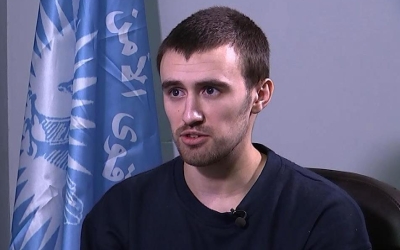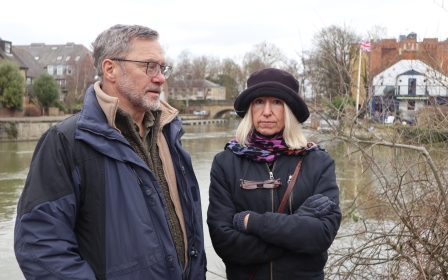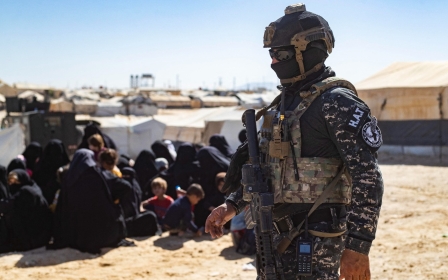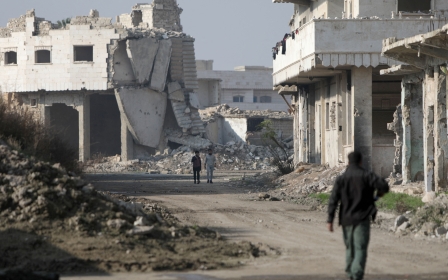Canadian delegation to seek access to detainees in northeast Syria prisons

A Canadian “humanitarian delegation” is to travel to Kurdish-controlled northeast Syria to try to gain access to Canadian nationals arbitrarily held in prisons and camps over suspected links to the Islamic State (IS) group.
Details of the proposed trip, which is due to take place in late August, were announced at a press conference in the Canadian parliament in Ottawa on Thursday – but the mission does not have the backing of the Canadian government.
The delegation includes Kim Pate, a member of the Senate, the upper house of the Canadian parliament; Scott Heatherington, a former senior diplomat; and Alex Neve, a veteran human rights lawyer and activist.
New MEE newsletter: Jerusalem Dispatch
Sign up to get the latest insights and analysis on Israel-Palestine, alongside Turkey Unpacked and other MEE newsletters
"I have great hope that our combined efforts will open the dialogue necessary to end this situation," said Pate.
"I very much want to assist where I can to try to break the impasse that has led us to this point and resolves the crisis in a humanitarian manner that reflects human rights and ends the unspeakable suffering that has gone on for far too long."
The delegation will seek to meet four Canadian men held in prisons run by the Kurdish-led Syrian Democratic Forces (SDF), as well as two women and three teenage girls believed to be still detained at al-Roj camp. It will also seek meetings with Kurdish officials to discuss steps towards repatriations.
Neve said the delegation would seek access to the detainees to assess firsthand their health, welfare, and well-being.
It comes after Canada’s Federal Court of Appeal in May overturned a court ruling ordering the Canadian government to arrange the men’s repatriation on the grounds that they were being unlawfully detained, and citing the dire conditions in which they were being held.
The Federal Court of Appeal ruled that the Canadian government had no obligation to repatriate the men. The families of the four men could still seek to take their own appeal to the Supreme Court.
'Obstacle after obstacle'
The most prominent of the four is Jack Letts, a 28-year-old from the UK who travelled into IS-controlled territory in Iraq and Syria aged 18 in 2014. He has been imprisoned by the SDF since 2017.
Letts, a British-Canadian national, was stripped of his British citizenship in 2019 along with dozens of other dual nationals who travelled to Syria from the UK. His parents have denied he was a member of IS, and say he was imprisoned by the group and later forced into hiding because he spoke out against it.
The other three men have remained anonymous during legal proceedings.
Sally Lane, Letts' mother, told Thursday's press conference she had not spoken to her son since July 2018 and had not had any updates on his detention since September 2021.
She said the Canadian government had put “obstacle after obstacle in front of families who are trying to rescue their children from inhumane camps”.
"This delegation is the only option to put an end, once and for all, to this current shameful political stalemate. It is the only decent, humane and right thing to do. It is time to bring Jack and the other Canadians home," said Lane.
Canada is among a number of western countries which have resisted bringing home their nationals – including women and children - among tens of thousands being held in the camps and prisons despite calls to do so by their Kurdish captors and international human rights organisations.
Senior US officials have also called on other countries to repatriate and have offered assistance to them to do so.
Neve said the Canadian government had declined the group’s offer to act as its official designated representatives – a key demand made by Kurdish authorities as part of the process of handing over custody of foreign nationals.
The group had originally offered to travel to the region in May, he said, accusing the government of purposefully obstructing repatriations and of acting “with no openness and transparency”.
“We remain open to being tasked by the Canadian government to be their designated delegates for repatriation," said Neve.
Lane told Middle East Eye she had been prepared to travel as part of a repatriation delegation in May, but would not do so in August.
"This delegation is to kickstart discussions on repatriation of the male detainees that should have happened years ago," she said.
"I was prepared to go on a repatriation trip in May. However, we never received authorisation for this. It would be too emotionally difficult for both Jack and me for me to go to Syria and return without him."
Following legal action brought by the families of the detainees, the Canadian government in April repatriated four women and 10 children from the camps.
But two women and three teenage girls who were also due to be repatriated on the same flight remain in Syria.
Lawyers for the women and girls said they had been detained and mistreated by Kurdish guards during 11 days in which they were missing. According to Canada’s foreign ministry, the five are now back at al-Roj.
A spokesperson for Global Affairs Canada, the Canadian foreign ministry, told Middle East Eye it advised against all travel to Syria.
"The safety and security of Canadians, both at home and abroad, is our utmost priority. Amidst reports of deteriorating conditions in the camps in northeastern Syria, we have been particularly concerned about the health and wellbeing of Canadian children."
It declined to comment specifically on the cases of Canadians still held in Syria “due to privacy and operational security considerations”.
Mazen Mustafa, a childhood friend of Letts speaking on behalf of the Friends of Jack Letts campaign group, told MEE that Letts and other detainees had been abandoned by their governments.
“The British and Canadian governments have continually failed to exercise their obligation to protect and fight for their citizens,” he said.
“This is why we need this delegation. I hope this is the beginning of justice being served for all those involved in this."
Middle East Eye delivers independent and unrivalled coverage and analysis of the Middle East, North Africa and beyond. To learn more about republishing this content and the associated fees, please fill out this form. More about MEE can be found here.





